Search Thermo Fisher Scientific
Invitrogen
CXCL9 Recombinant Rabbit Monoclonal Antibody (11H1L14)
This Antibody was verified by Cell treatment to ensure that the antibody binds to the antigen stated.
FIGURE: 1 / 8
CXCL9 Antibody (701117) in ICC/IF
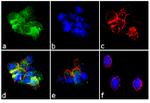



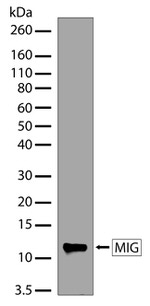
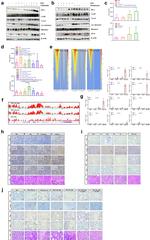
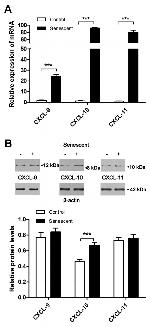
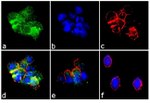
Product Details
701117
Species Reactivity
Published species
Host/Isotype
Expression System
Class
Type
Clone
Immunogen
Conjugate
Form
Concentration
Purification
Storage buffer
Contains
Storage conditions
Shipping conditions
RRID
Product Specific Information
Intact IgG appears on a non-reducing gel as ~150 kDa band and upon reduction generating a ~25 kDa light chain band and a ~50 kDa heavy chain.
Recombinant rabbit monoclonal antibodies are produced using in vitro expression systems. The expression systems are developed by cloning in the specific antibody DNA sequences from immunoreactive rabbits. Then, individual clones are screened to select the best candidates for production. The advantages of using recombinant rabbit monoclonal antibodies include: better specificity and sensitivity, lot-to-lot consistency, animal origin-free formulations, and broader immunoreactivity to diverse targets due to larger rabbit immune repertoire.
Target Information
MIG, also known as CXCL9, is a T-cell chemoattractant inducible by gamma interferon that is a member of the CXC chemokine family of cytokines.This gene is mapped to 4q21. It is noted that, although the best-described activities of the chemokines are as chemotactic factors, chemokines also have an effect on T-cell activation, angiogenesis, and HIV infection. While most CXC chemokines are chemotactic for neutrophils, MIG and INP10 are unusual and similar in being CXC chemokines that are chemotactic for lymphocytes and inactive in neutrophils.
For Research Use Only. Not for use in diagnostic procedures. Not for resale without express authorization.
Bioinformatics
Protein Aliases: C Cmotif chemokine; C X C motif chemokine; C-X-C motif chemokine 9; CC motif chemokine; CCmotif chemokine; chemokine (C-X-C motif) ligand 9; CXC; CXC motif chemokine; CXCL; gamma interferon-induced monokine; Gamma-interferon-induced monokine; HuMIG; M119; MIG; monokine induced by gamma interferon; Monokine induced by interferon-gamma; Protein m119; small inducible cytokine B subfamily (Cys-X-Cys), member 9; Small-inducible cytokine B9
Gene Aliases: BB139920; CMK; crg-10; CXCL9; Humig; MIG; MuMIG; SCYB9
UniProt ID: (Human) Q07325, (Mouse) P18340
Entrez Gene ID: (Human) 4283, (Mouse) 17329

Performance Guarantee
If an Invitrogen™ antibody doesn't perform as described on our website or datasheet,we'll replace the product at no cost to you, or provide you with a credit for a future purchase.*
Learn more
We're here to help
Get expert recommendations for common problems or connect directly with an on staff expert for technical assistance related to applications, equipment and general product use.
Contact tech support
